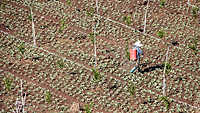EPA Meets to Assess Glyphosate’s Link to Cancer

The U.S. Environmental Protection Agency (EPA) has tasked a panel of independent experts--the Federal Insecticide, Fungicide and Rodenticide Act Scientific Advisory Panel--with meeting this week with the goal of determining once and for all whether or not glyphosate--the most commonly used herbicide in the world--is linked to cancer.
The meetings, which started on Tuesday, will continue through through December 16. At least one of those days, the panel will welcome commentary from stakeholders--agricultural experts, scientists and activists--will either support or negate the use of glyphosate on food crops. What the EPA panel is tasked with is determining how existing research data should be interpreted, and how that information should translate into a “carcinogenic risk” warning for glyphosate.
Over the years, there have been conflicting reports regarding glyphosate’s safety. In September 2016, EPA released an independent report stating that, after a 2 year review, glyphosate is “unlikely to pose a carcinogenic hazard to humans.” However, in 2015, the World Health Organization’s International Agency for Research on Cancer concluded that the herbicide in fact is a “possible” human carcinogen, an assertion that the agency again reiterated in 2016.
EPA plans to have a risk assessment for glyphosate completed by spring of 2017.
Related articles:
FDA Halts Testing of Glyphosate, A Possible Carcinogen
EFSA: Pesticide Residues Pose Low Consumer Risk
Report: Genetically Modified Crops Pose No Health Risks
Sign up for Food Safety Magazine’s bi-weekly emails!
Looking for a reprint of this article?
From high-res PDFs to custom plaques, order your copy today!





